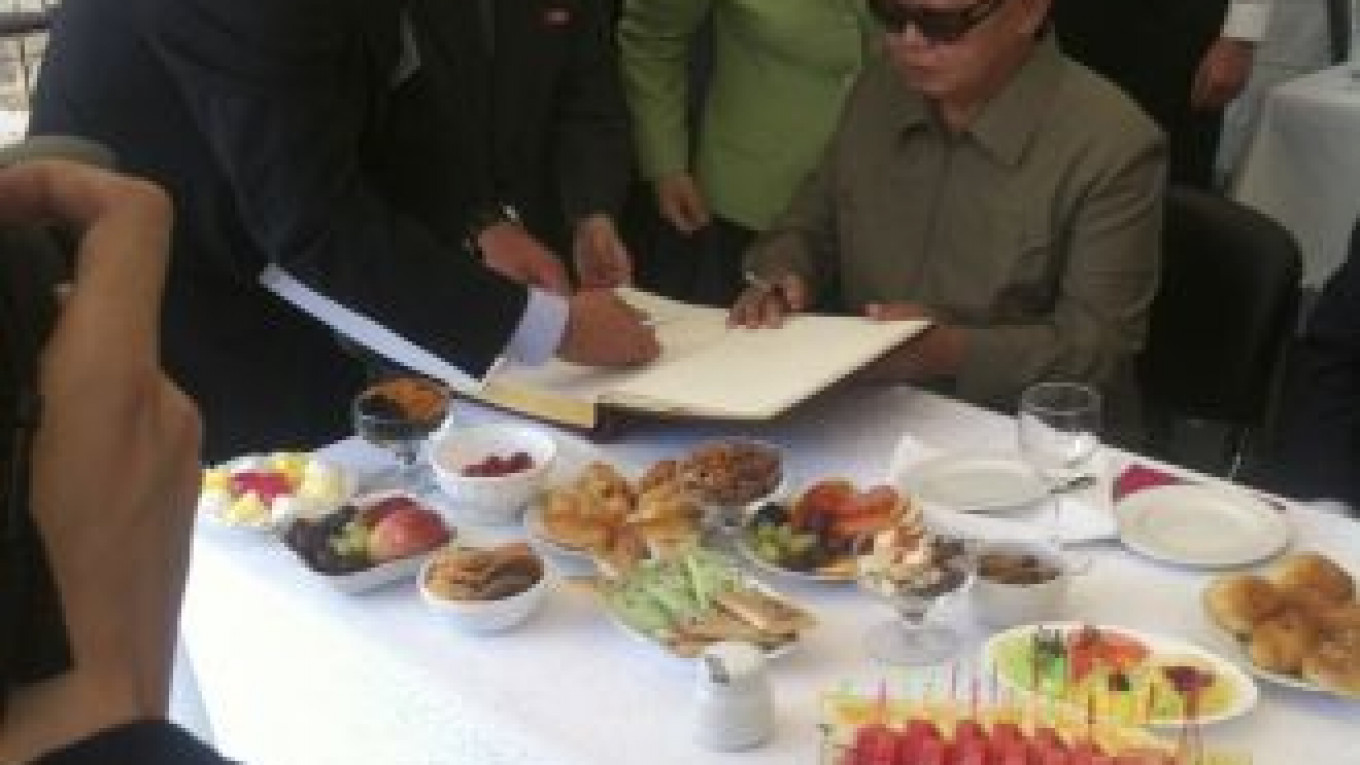Military officers flew to North Korea for talks about renewing military ties on Monday as North Korean leader Kim Jong Il's armored train rolled through the resource-rich Far East on his secretive journey to a summit with President Dmitry Medvedev.
Kim is to meet Medvedev later this week near Lake Baikal during his first visit to his country's Cold War ally in nine years. North Korea is increasingly showing signs it is prepared to restart six-nation disarmament talks in exchange for aid.
Russian military officials arrived in the North Korean capital on Monday for a five-day visit, Itar-Tass reported from Pyongyang. The Russian Defense Ministry said the talks would focus on the renewal of military cooperation between the countries, possible joint exercises "of a humanitarian nature" and an exchange of friendly visits by Russian and North Korean ships.
Russia and North Korea also will discuss "possibilities of joint exercises and training of search and rescue operations for sinking vessels as well as providing assistance to people during natural disasters."
Defense analyst Alexander Golts said North Korea's goal in inviting the Russian military could be to assuage fears of instability, because Russia is considering building a natural gas pipeline through North Korea. The pipeline is expected to be one of the main topics of Kim and Medvedev's talks.
Golts said it was highly unlikely Russia would renew arms sales to North Korea, which would not be in its interests as a participant in the six-party talks. He also noted the low level of the Russian delegation, which is led by the commander of Russia's Eastern Military District.
Kim's train crossed into Russia on Saturday morning and passed through Khabarovsk before heading west along a railway running roughly parallel with Russia's borders with China and Mongolia. The itinerary for his visit, expected to last about a week, has been largely kept secret because of what appear to be North Koreans' high security concerns.
The first and so far only time Kim is known to have left the train was during a stop Sunday at the small Bureya station in the Amur region. Flags of the two countries fluttered at the railway station, while a military band played welcoming music and Russian women in national dress offered Kim traditional gifts of bread and salt.
Kim was then taken in his armored Mercedes for a tour of a hydroelectric power plant and its 139-meter dam on the Bureya River. He was briefed on the plant's history and electricity production capacity and praised the enormous building, the North's official Korean Central News Agency reported from Pyongyang.
"Inexhaustible is the strength of the Russian people," Kim wrote in the visitor's book, KCNA said.
Russia has proposed transmitting surplus electricity produced by the Amur plant to both North and South Korea, South Korean media have reported.
South Korean President Lee Myung-bak, while on a visit to Mongolia, said Monday that "if [Kim] frequently visits and looks at an open society, that will eventually positively affect North Korea's economic development," spokesman Park Jeong-ha said, according to South Korea's Yonhap news agency.
The Amur.info news web site reported Monday that people living near the Bureya station were told to stay away from windows and prohibited from taking pictures. The local residents, however, were grateful for the makeover of the station's square, which was newly paved for Kim's visit, the web site said.
Kim's next stop was unclear. Yonhap, however, citing an unidentified Russian intelligence source, reported Monday that the North Korean leader's train could be heading toward the Amur region city of Skovorodino.
Skovorodino is the starting point for a 1,000-kilometer oil pipeline linking oil fields of eastern Siberia and China that was inaugurated last year. Yonhap said Kim's expected stop at Skovorodino could be related to Russia's proposal to provide energy to the Korean Peninsula.
Kim's train is traveling along the Trans-Baikal Railway and believed to be headed for Ulan-Ude, the capital of Buryatia, for the summit with Medvedev.
There were signs that preparations were being made for Kim to visit the village of Turka, located on the shores of Lake Baikal. The Baikal Daily web site quoted residents as saying that a local police officer has been making the rounds to take down the names and addresses of all the people in the village.
One key topic for Medvedev and Kim's talks is expected to be the construction of a pipeline that would stream Russian natural gas through the North's territory to the South. South Korean media said the North could earn up to $100 million every year, but negotiations haven't reported much progress because of the nuclear dispute.
Gazprom officials visited North Korea in early July for talks on the gas pipeline.
A Message from The Moscow Times:
Dear readers,
We are facing unprecedented challenges. Russia's Prosecutor General's Office has designated The Moscow Times as an "undesirable" organization, criminalizing our work and putting our staff at risk of prosecution. This follows our earlier unjust labeling as a "foreign agent."
These actions are direct attempts to silence independent journalism in Russia. The authorities claim our work "discredits the decisions of the Russian leadership." We see things differently: we strive to provide accurate, unbiased reporting on Russia.
We, the journalists of The Moscow Times, refuse to be silenced. But to continue our work, we need your help.
Your support, no matter how small, makes a world of difference. If you can, please support us monthly starting from just $2. It's quick to set up, and every contribution makes a significant impact.
By supporting The Moscow Times, you're defending open, independent journalism in the face of repression. Thank you for standing with us.
Remind me later.






